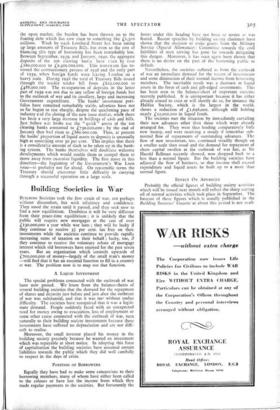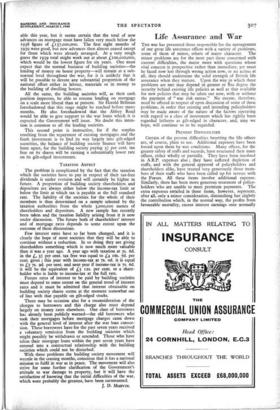Building Societies in War
A LIQUID INVESTMENT The special problems connected with the outbreak of war have now passed. We know from the balance-sheets of several building societies that the demand for the repayment of shares and deposits just before and just after the outbreak of war was substantial, and that it was met without undue difficulty. The societies have recognised that it was a legiti- mate demand. People suddenly faced with an unexpected need for money owing to evacuation, loss of employment or some other cause connected with the outbreak of war, turn naturally to their building society investments because these investments have suffered no depreciation and are not diffi- cult to realise.
Moreover, the small investor placed his money in the building society precisely because he wanted an investment which was repayable at short notice. In adopting this form of capitalisation the building societies have assumed certain liabilities towards the public which they did well carefully to respect in the days of crisis.
POSITION OF BORROWERS
Equally they have had to make some concessions to their borrowing members, many of whom have either been called to the colours or have lost the income from which they made regular payments to the societies. But fortunately the losses under this heading have not been so severe as was feared. Recent speeches by building soc;ety chairmen have shown that the decision to make grants from the Military Service (Special Allowances) Committee towards the civil liabilities of men serving has gone far towards mitigating this danger. Moreover, it has once again been shown that there is no desire on the part of the borrowing public to default.
Nevertheless, the societies suffered as from the outbreak of war an immediate demand for the return of investments and some diminution of their normal income from borrowing members. The inevitable result was a decrease in liquid assets in the form of cash and gilt-edged investments. This has been seen in the balance-sheet of important societies recently published. It is unimportant because it has either already ceased to exist or will shortly do so, for instance the Halifax Society, which is the largest in the world, shows a reduction of £1,698,000, although still holding nearly £22,000,000 in liquid funds.
The societies met the situation by immediately curtailing their new advances other than those which were already arranged for. They were thus lending comparatively little new money, and were receiving a steady if somewhat sub- normal flow of repayments of outstanding advances. The flow of new investment, too, continued steadily though on a smaller scale than usual and the demand for repayment of share capital swollen at the outbreak of war has, as Sir Harold Bellman recently showed, now dropped back to a less than a normal figure. But the building societies have adjusted the flow of business, so that income shall exceed expenditure and liquid assets be built up to a more than normal figure.
EFFECT ON ADVANCES
Probably the official figures of building society activities which will be issued next month will reflect the sharp cutting off of normal activities which took place in September. The forecast of these figures which is usually published in the Building Societies' Gazette at about this period is not avail- able this year, but it seems certain that the total of new advances on mortgage must have fallen very much below the 1938 figure of £137,000,000. The first eight months of 1939 were good, but new advances then almost ceased except for those which were already arranged. At a very rough guess the 1939 total might work out at about £I00,000,000, which would be the lowest figure for six years. One must expect that the normal business of building societies—the lending of money on house property—will remain at a sub- normal level throughout the war, for it is unlikely that it will be possible to devote any substantial proportion of the national effort either in labour, materials or in money to the building of dwelling houses.
All the same, the building societies will, as their cash position improves, be able to resume lending on mortgage on a scale more liberal than at present. Sir Harold Bellman foreshadowed that this stage might be reached before many months. He also foreshadowed that the Abbey Road would be able to give support to the war loans which it is expected the Government will issue. No doubt this inten- tion is common to all the leading societies.
This second point is instructive, for if the surplus resulting from the repayment of existing mortgages and the fresh investment is to find its way largely into gilt-edged securities, the balance of building society finance will have been upset, for the building society paying 3+ per cent. tax free on its shares will be earning a substantially lower rate on its gilt-edged investments.
TAXATION ASPECT
The problem is complicated by the fact that the taxation which the societies have to pay in respect of their tax-free dividends is under revision and will certainly be higher in future. A proportion of building society shareholders and depositors are always either below the income-tax limit or below the limit at which tax is payable at the full standard rate. The liability of the societies for the whole of their members is thus determined on a sample selected by the taxation authorities from the whole 3,000,000 names of shareholders and depositors. A new sample has recently been taken and the taxation liability arising from it is now under discussion. The future both of shareholders' interest and of mortgage rates depends to some extent upon the outcome of these discussions.
Few interest rates have so far been changed, and it is clearly the hope of most societies that they will be able to continue without a reduction. In so doing they are giving shareholders something which is now much more valuable than it was a year ago. A year ago with taxation at 5s. 6d. in the L, 3+ per cent. tax free was equal to £4 16s. 7d. per cent. gross ; this year with income-tax at 7s. od. it is equal to £5 7s. 9d. per cent. and next year if income-tax is 7s. 6d. it will be the equivalent of £5 125. per cent. to a share- holder who is liable to income-tax at the full rate.
Future rates of interest to be paid by building societies must depend to some extent on the general trend of interest rates and it must be admitted that interest obtainable on building society shares seems at the moment somewhat out of line with that payable on gilt-edged stocks.
There may be occasion also for a reconsideration of the charges to borrowers and this charge also must depend largely on money rates elsewhere. One class of borrowers has already been publicly warned—the old borrowers who took their mortgages before mortgage charges came down with the general level of interest after the war loan conver- sion. These borrowers have for the past seven years received a voluntary remission from the building societies which might possibly be withdrawn or amended. Those who have taken their mortgage loans within the past seven years have entered into a contractual relationship with the building societies which could not be disturbed.
With these problems the building society movement will wrestle in the coming months, conscious that it has a national mission to fulfil in war as in peace. The movement will also strive for some further clarification of the Government's attitude to war damage to property, but it will have the satisfaction of knowing that the initial difficulties of the war, which were probably the greatest, have been surmounted.
J. D. MARVIN.















































 Previous page
Previous page